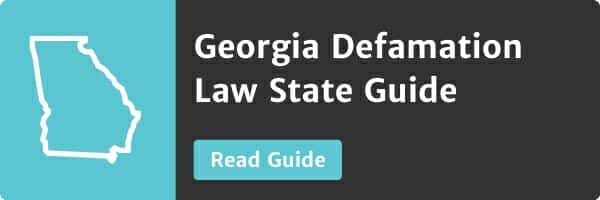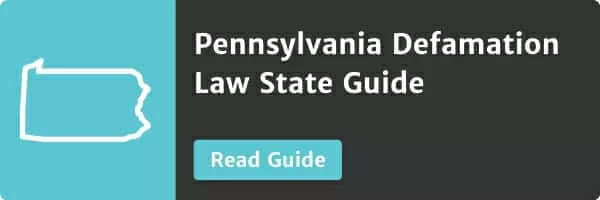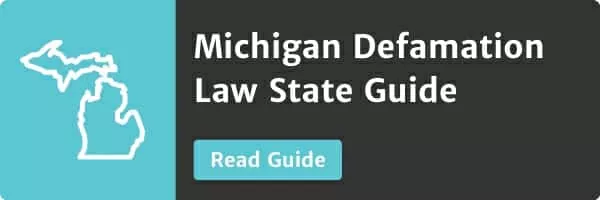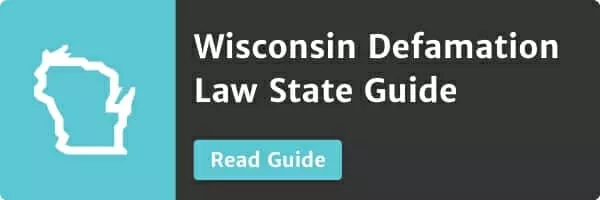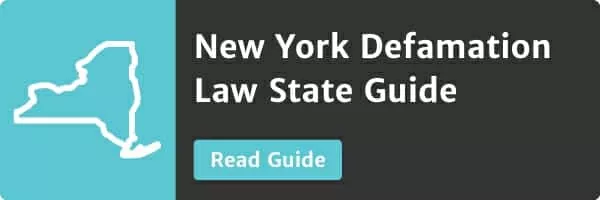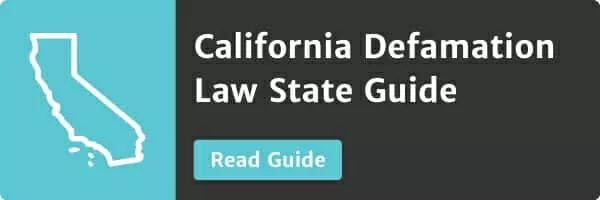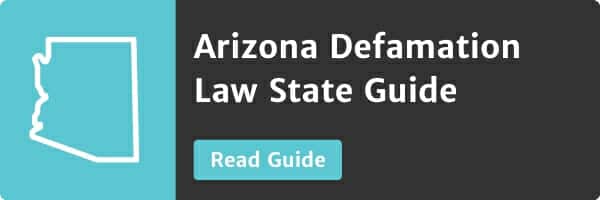
- Originally Published on April 3, 2018
The Minc Law Guide to Utah Defamation Law
Utah’s Definition of Defamation
Defamation, also known as defamation of character, is an overarching legal term defined as the “act of making a false statement to a third-party, resulting in harm to one’s reputation.” In Common Law jurisdictions, defamation is considered a civil wrong, and may also be referred to as the “tort of defamation.” More specifically, it can be broken down into two types:
- Slander: the spoken communication of a false statement to a third-party resulting in harm to one’s reputation.
- Libel: the written or published communication of a false statement to a third-party resulting in harm to one’s reputation.
Utah defines a “defamatory statement” as one that:
“Challenges a person’s honesty, integrity, virtue, or reputation; exposing them to public hatred, contempt or ridicule.” Mast v. Overson, 971 P2d. 928. (Utah App. 1998), quoting West v. Thomson Newspapers, 872 P.2d 999, 1008 (Utah 1994). Accord Utah Code Ann. Sec. 45-2-2(1) (1993).
Utah Elements of Defamation
More specifically, a person bringing a defamation lawsuit in the state of Utah must prove the following elements:
- The defendant published the statements;
- The statements were false, defamatory, and not subject to any defense of privilege;
- The statements were published with the requisite degree of fault; and
- The publication resulted in damage to the plaintiff.
All four elements will be addressed in this comprehensive blog post.
Online Defamation of Character Tip: Setting up Google Alerts is an effective way to monitor your online reputation and any negative keywords associated with it. Google Alerts is free, and will notify you immediately if your name is mentioned in conjunction with any of your inputted keywords.
ᐧ
If you’ve been the victim of online defamation and want to remove it, reach out to the internet defamation lawyers of Minc Law.
The Minc Law team of defamation removal lawyers have secured hundreds of swift and permanent removals, and all for a flat, reasonable fee.
Call us today to schedule a free, no-obligation, initial consultation with an intake specialist at (216) 373-7706, or schedule a meeting by filling out our online contact form.
Utah’s Pleading Standard for Defamation
Pleadings are certain formal documents filed with a court stating a party’s basic claims and positions against a defendant(s). To help you first understand what pleadings are, here are some common examples of pre-trial pleadings:
- Complaint: a document setting forth the plaintiff’s version of the case facts, issues, and specific damages.
- Answer: the defendant’s response to the plaintiff’s complaint, responding to the plaintiff’s claims, and typically arguing why the plaintiff shouldn’t prevail.
- Reply: the answer (by either party) to new claims, facts, or issues raised in pleadings.
- Counterclaim: a claim by the defendant asserting they were injured by the plaintiff.
Depending on the nature of the claim brought forth by the plaintiff, there will be different pleading requirements, such as specific procedural requirements and specificity.
Utah law DOES require a plaintiff’s claim identify the defamatory statement, either by its:
- “Words, or
- Words to that effect.”
That means general conclusory statements will be considered inadequate, and plaintiffs must plead the actual statement or the gist of it. “I was defamed” would be considered a conclusory statement, as it proves neither the actual statement giving rise to defamation nor any surrounding details – it is merely conclusory.
Additionally, Utah law requires defamation of character claims must specify:
- What was said,
- To whom it was said, and
- When it was said, and
- Where it was said.
However, some Utah courts have refused to dismiss complaints that identified the statements made and who heard them, but failed to state when or to whom the statements were made.
Why does Utah require such specificity and particularity?
Because it provides the court a better scope of whether the statement is defamatory, and allows defendants to better understand the claim and formulate a defense.
Let’s take a further look at some statements that are considered so inherently defamatory that plaintiffs need not prove the fourth element of a defamation claim – damages. This is known as ‘defamation per se’.
What Statements Are Considered ‘Defamation Per Se’ in Utah?
In Utah, statements will be considered “per se” if they contain words that, on their face, and without the aid of intrinsic proof, are unmistakably recognized as injurious.
To constitute defamation per se, the alleged defamatory statement must address one of the following four factors:
- The statement pertains to criminal conduct committed by the plaintiff;
- The statement imputes a loathsome disease on the plaintiff;
- The statement alleges the plaintiff acted incompatibly with the existence of a lawful business, trade, profession, or office; and
- The statement imputes unchastity on a woman.
Keep in mind, if there can be two interpretations to one statement, both a good and bad interpretation, then a statement will not be considered defamation per se in Utah.
Now, let’s take a look at four examples of statements brought to the attention of Utah courts and their decisions.
Business, trade, profession, or office
- Attorney review: Alleged defamatory statements published in an online review that an attorney was the “worst ever” and “had to” be fired by his client were dismissed for failure to state a claim because the comments were expressions of opinion that were not capable of being objectively verified and the facts underlying the client’s statements were not defamatory.
- Election notice: An “election notice” published on a newspaper’s website accusing a city council candidate of “negative campaigning” and distributing “false and misleading information” in an advertisement challenging other candidates’ eligibility did not constitute defamation. The court found the candidate failed to adequately plead special damages, the allegedly defamatory statements were protected by Utah’s public interest privilege, the statements did not actually convey a defamatory meaning as a matter of law, and the statements were editorial opinion.
- Potential cafe buyers: In a case where the defendant mailed letters to potential buyers of a plaintiff’s cafe, stating the plaintiff “is a clever crook,” the court held the defendant’s words both stated and printed were actionable because they were used in the context where they were reasonably understood to impute dishonesty and injure the plaintiff in his business or vocation.” Prince v. Peterson, 538 P.2d 1325, 1328 (Utah 1975).
Criminal conduct
- Landlord-tenant troubles: Statements made online by a tenant alleging her previous landlords were “crooks and will take advantage of you!” was not considered defamation per se because of its context of being posted on an online forum, where even the most careless reader would understand the word ‘crooks’ to be no more than rhetorical hyperbole. Additionally, such statement could merely be a reference to crooked behavior, and not a direction violation of the criminal code.
Now, let’s take a look at the exact opposite of defamation per se, referred to as ‘defamation per quod’.
Defamation Per Quod
The exact opposite of defamation per se, defamation per quod is defamation that is not inherently apparent on its face and requires extrinsic and supporting evidence to prove its defamatory nature.
To learn more about the various damages associated with defamation per se and defamation per quod actions, please see Section 5: Defamation Damages.
When bringing a defamation claim, there are certain requirements and formalities plaintiffs must follow in order to bring a successful claim – all of which will are addressed below.
Important Utah Defamation Requirements & Formalities
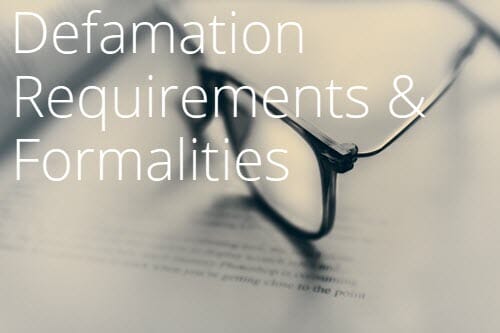
Do Utah Courts Have Jurisdiction Over Out-of-State Defendants?
Simply put, Yes.
Utah courts have jurisdiction over out-of-state defendants:
- Who publish subscription electronic publications viewed by multiple Utah residents on dedicated computer screens,
- That defames a plaintiff with Utah residence, and
- That defamation results in lost business to the Utah plaintiff.
It’s important to note that the newsletter doesn’t need to have thousands or even hundreds of subscribers for an actionable claim. A Utah court found that an out-of-state publisher was subject to Utah jurisdiction for distributing a defamatory online trade newsletter to its 60 Utah subscribers.
More specifically, a Utah federal district court outlined three circumstances in which a website accessed in Utah will subject an out-of-state defendant to jurisdiction in Utah.
- Jurisdiction will be established when a defendant clearly does repeat business over the Internet;
- No jurisdiction will exist when internet use merely makes information available to interested parties; and
- Utah jurisdiction may be enforceable over out-of-state operators of “interactive” websites where a user can exchange information with the host computer if there is a high level of interactivity and information exchanged is commercial in nature.
And finally, Utah courts will have jurisdiction over an out-of-state business in a defamation claim where:
- The out-of-state company purchased products from a Utah company; and
- Posts defamatory online comments and photographs in response to the purchases.
However, defamatory comments posted to an online forum, with no specific connection to Utah alone, are not enough to satisfy the minimum contacts requirement for jurisdiction.
For example, the possibility of a single e-mail that might have been published in Utah was considered insufficient connection to establish personal jurisdiction for a claim of trade libel.
So, what’s the takeaway from all of this? Just because a malicious online troll or defamer lives out-of-state, does not mean they are immune from a defamation of character lawsuit in Utah.
Online Libel Removal Tip: The term ‘jurisdiction’ refers to the scope and authority of a legal body, such as a court, to make judgments and decisions on legal matters. In the United States, jurisdiction can be divided into three types: (1) Subject matter jurisdiction, (2) Jurisdiction over the person, and (3) Territorial jurisdiction.
In Which Venue Can Utah Defamation Plaintiffs Sue a Defendant (Where Can I Sue For Defamation?)
In a diversity of citizenship case, venue will be proper in:
- A judicial district where any defendant resides, if all defendants reside in the same state;
- A judicial district in which a substantial part of the events or omissions giving rise to the claim occurred, or a substantial part of property that is the subject of the action is situated; or
- A judicial district in which any defendant is subject to personal jurisdiction at the time the action is commenced, if there is no district in which the action may otherwise be brought.
To clarify any confusion, here is an easy-to-follow flow chart to help you understand the proper venue for suing a defamation defendant(s).
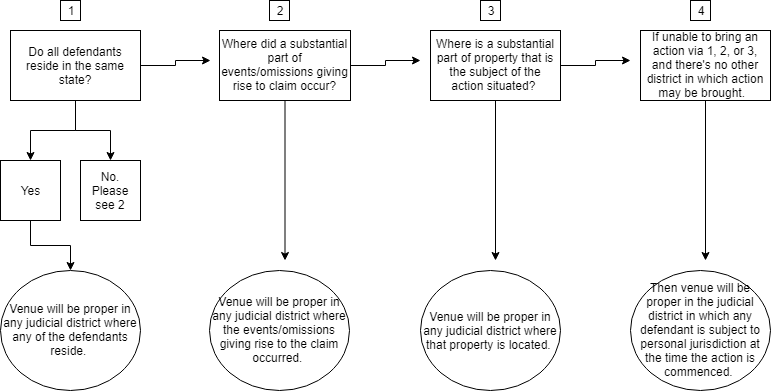
Does Utah Have a Statute of Limitations For Bringing Defamation Claims?
First, a statute of limitations is a law requiring plaintiffs to bring and initiate legal proceedings within a specific period of time. Should a plaintiff fail to bring their claim within the specified time period, they will no longer be able to file a claim and it will likely be dismissed.
Video: What is the Statute of Limitations for Defamation in the U.S.?

In Utah, plaintiffs have one (1) year to bring forth a cause of action for a defamation claim.
However, there are several statutory exceptions that may allow a plaintiff to bring a libel or slander action after an expired statute of limitations.
3 Exceptions to Utah’s Defamation Statute of Limitations
- Fraudulent concealment: If the plaintiff cannot identify the person who allegedly committed libel due to fraudulent concealment of that person’s identity, then the discovery rule supersedes the statute of limitations until the plaintiff receives reliable and precise information regarding who committed the libel.
- Governmental entity: If a defamation claim is made against a governmental entity, then Utah’s Governmental Immunity Act’s procedural requirements will apply instead of the statute of limitations.
- Title action: In a slander of title action, a two-year statute of limitations applies from the moment one tries to sell the property subject to the slander of title.
Single Publication Rule
The ‘single publication rule’ is a legal principle governing the cause of action accrual date and statute of limitations for libel claims. Under the single publication rule, plaintiffs to a libel suit may only bring one claim for each mass publication by a publisher, and not a claim for every book or issue that is run.
This generally occurs in situations where a newspaper, magazine, or other editorial body publishes multiple copies or prints of a defamatory statement. The purpose? To avoid a “multiplicity of actions” and to protect defendants from excessive liability based on a publication.
The Utah Supreme Court has not dealt with this issue so far.
Defamation Removal Tip: In order to protect your brand and reputation, there are several free steps you can take to suppress negative search results and minimize your negative digital footprint. (1) Combat negative keywords by producing positive and frequent content, (2) Start a blog and update it frequently, (3) Make your social media profiles public and comment regularly, and (4) Link between your social media accounts.
ᐧ
How does Utah’s statute of limitations timeframe stack up against other states?
Generally, most states have one to two year statute of limitations for defamation of character claims. For reference, here’s a list of a few states and their defamation statutes of limitations.
| Ohio | One (1) year |
| New York | One (1) year |
| Florida | Two (2) years |
| South Carolina | Two (2) years |
| New Hampshire | Three (3) years |
| Massachusetts | Three (3) years |
If you’ve been defamed online or the victim of malicious slanderous statements, the defamation removal attorneys of Minc Law want to fight for you.
At Minc Law, we boast a nearly 100% removal rate from websites and have litigated in over 19 states and 3 countries.
Call us today to schedule a free, initial, no-obligation consultation with an intake specialist at (216) 373-7706, or by scheduling a meeting online.
Public vs. Private Persons: Which One Am I?
When dealing with defamation of character claims, the rights afforded to private and public persons can differ substantially, so it’s important to understand the differences, and which category you fall under.
But, why does it matter?
First addressed in the 1964 defamation case of New York Times Co. v. Sullivan, the United States Supreme Court found that differentiating between private and public persons was vital for promoting “uninhibited debate of public issues” and the First Amendment. The court found in order to succeed in a defamation claim, private and public plaintiffs have two separate burdens of proof.
Private persons: Private persons are required to prove a defendant acted with ordinary negligence when publishing or making a false statement. Ordinary negligence is defined as the care that would be exercised by a reasonably prudent person in similar circumstances.
Public persons: Public persons have availed themselves to a higher degree of scrutiny. Think politicians, celebrities, and other notable figures. In the best interest of social policy and free speech, it is important the general public feel safe and protected discussing hot-topic and contentious matters without fear of legal repercussion. Public persons are required to prove defendants published or made a statement with actual malice – or knowledge the statement was false or reckless disregard for whether it was false or not.
You can read up further on the burdens of ordinary negligence and actual malice in our detailed blog post explaining defamatory statements.
Utah defamation law expands upon the two traditional notions of defamation plaintiffs – private and public persons – and accounts for four specific defamation plaintiffs:
- Private citizens,
- Public officials,
- All-purpose public figures (APPFs), and
- Limited-purpose public figures (LPPFs).
Specifically, Utah courts adopt the Supreme Court ruling that public figure plaintiffs face different burdens of proof to establish the prima facie case for defamation.
Defamation Law Fact: In the realm of defamation litigation, the United States is typically considered a defendant-friendly jurisdiction due to its long preservation of the First Amendment, while European and other Commonwealth countries are generally considered pro-plaintiff.
ᐧ
Now, let’s take a look at what the United States Supreme Court and Utah Courts considered to be issues of private and public concern. Depending on the nature of the statement or issue, a party may receive greater protection from defamation liability.
Issues of Private vs. Public Concern
Generally, statements of public concern are afforded greater protection from liability for defamation due to the promotion of a well-informed and healthy society. Without such protection, our media would receive heightened censorship and an overall less-informed society. What this means is that depending on the nature of the statement, private plaintiffs may be required to prove more than mere negligence in order to recover damages.
First, let’s take a look at what the United States Supreme Court has ruled on private vs. public issues. The United States Supreme Court required the proving of actual malice to a defamation case brought by a “private person” against a media defendant when “an event of public or general concern” was the focus of the publication.
How does this stack up compared to Utah?
The Utah Supreme Court declined to rule definitively, but commented that the constitutional standard would likely apply when a private individual is defamed by defamatory speech regarded as a matter of public concern.
What exactly is a matter of public concern?
Public concern is defined as a “legitimate issue with respect to the functioning of governmental bodies, officials, or public institutions, or with respect to matters involving the expenditure of public funds.
- Government bodies,
- Officials,
- Public institutions, and
- Matters involving the expenditure of public funds.
A public controversy is considered any topic upon which sizeable segments of society discuss different, strongly held views. Id. A general concern or interest will NOT suffice without active debated of formulated opinions. Furthermore, if the issue is being debated publicly and has foreseeable and substantial ramifications for nonparticipants, then it is a public controversy.
In Jacob v. Bezzant, Jacob provided no evidence to refuse a district court’s finding that the Election Notice addressed the qualifications of Mr. Hunter and Mr. Storrs for public office, and was published in the midst of a controversy over the qualifications of candidates. As a result, the court concluded that the statements were protected by the public interest privilege.
Online Defamation Tip: If you’ve been defamed online, it’s important to document and preserve any evidence supporting your claim. Screenshotting the allegedly defamatory material is an effective way of supporting your claim, ensuring you aren’t bringing a frivolous suit, and refuting evidence you tampered with the posting or review.
ᐧ
Common Defenses to Defamation in Utah
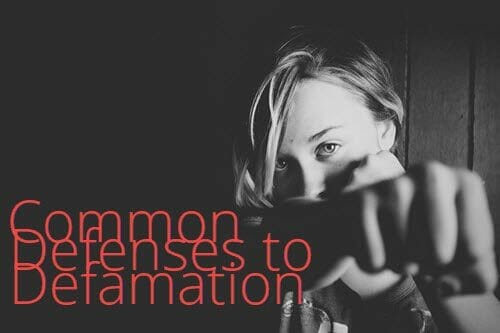
Even if a party publishes or makes a defamatory statement, there are numerous defenses and circumstances in which those statements are either authorized or protected by law, and the defendant will not be held liable for defamation.
Below is a list of some of the most commonly used defenses to the tort of defamation of character in Utah.
- Opinion
- Truth/Falsity
- Privilege (Absolute, Qualified, Statutory & Fair Report), &
- Incremental Harm Doctrine,
- Republication Doctrine, &
- Communications Decency Act.
Let’s first start with the commonly used defense of ‘Opinion,” one which is recognized in nearly every U.S. state.
Opinion
Under the Utah Constitution, a statement that expresses a mere opinion or belief, rather than a verifiable statement of fact is protected by law and cannot support a defamation claim.
However, Utah courts limit the availability of a defamation action where maintaining it would “abridge or restrain” a free press.
The common law rule followed in Utah is that there can be NO cause of action for mere opinion statements.
When determining whether a statement should be classified as opinion or not, Utah courts balance four factors.
- The common usage or meaning of the words used;
- Whether the statement is capable of being objectively verified as true or false;
- The full context of the statement; and
- The broader setting in which the statement appears.
Simply put, the core difference between opinion and fact is whether or not the statement can be proved true or false in a court of law. If a statement can be proved as true or false, then, the case will proceed. However, if the statement cannot be proved true or false, courts will likely dismiss the libel or slander case without it ever having to go to a jury.
You can read up more on whether an opinion is considered defamatory in our detailed blog post, “The Opinion Defense: Can a Statement of Opinion Be Defamatory?”.
3 Core Examples of Opinion in Utah
- Editorial column criticism: Criticism in an editorial column about the political position of an elected public official was protected opinion because it was not verifiable as true or false in the context and broader setting suggested it was not intended as fact.
- Online attorney review: Alleged defamatory statements in an online review that an attorney was the “worst ever” and “has to” be fired by his client were dismissed for failure to state a claim because the comments were expressions of opinion that were not capable of being objectively verified. Additionally, the facts underlying the client’s statements were not defamatory.
- Job performance & termination: A newspaper report that an individual was terminated for poor performance and erratic behavior was deemed to be a non-actionable expression of opinion because the allegations contained words commonly used to convey subjective belief that could not be obectively verified as true or false within the context of an employment dispute.
So, what’s the core theme in all of these cases? The statement needs to be able to be objectively verified as true or false for an actionable defamation claim.
There is a notable exception in Utah to the defense of opinion. Abuse.
Abuse of Opinion
In Utah, abuse of the opinion defense will occur when that opinion states or implies false and defamatory facts.
Just because a defendant claims opinion, does not mean it will always be upheld, especially where they have incorporated false and defamatory facts within that opinion.
Truth/Falsity
As defamation deals with a false statement asserting fact, it should be no surprise that truth is a complete defense to the charge of defamation. After all, you can’t claim something to be false, when it is in fact the truth.
The Utah Supreme Court ruled that the defense of truth will apply to:
“Statements infected with inaccuracy, innuendo, and outright falsity, so long as their ‘gist’ or ‘sting’ rings true.”
Jensen v. Sawyers, 2005 UT 81, 130 P.3d 325 (Utah 2005).
It’s worth noting that the defense of truth does not require a defendant to “prove the literal truth of the precise statement made,” noting that “insignificant inaccuracies of expression are immaterial, provided that the defamatory charge is true in substance.” Auto West, Inc. v. Baggs, 678 P.2d at 290-91, citing Crellin v. Thomas, 247 P.2d 264, 266 (Utah 1952).
Simply put, if the crux of the statement is true, then truth may be used as a valid defense. Everyday we forget or misremember immaterial details concerning stories, but that still does not take away from the veracity of the story as a whole.
Exception to Truth Defense
Utah does recognize an exception to the truth defense to defamation where a doctor violates a patient’s confidence and publishes derogatory matter concerning him. A plaintiff may bring an action for any injury suffered, regardless of the truth or falsity of the statements.
Our society places emphasis on certain professions to uphold determined standards of conduct – one being confidentiality – when a professional, such as a doctor, breaches such core professional duty, the defense of truth will not apply.
Example of Truth as a Defense
The constitutionality of the Utah criminal libel statute was challenged because it failed to punish only for “actual malice” and did not provide for truth as an absolute defense for disparaging comments made on a website by a high school student about his teachers, classmates, and principal.
Privilege
Privilege is defined as the special legal entitlement, right, or immunity, permitting persons to make and publish certain statements, regardless of whether or not they are defamatory. Privilege exists in order to promote debate and discussion of hot-topics in order to further political, financial, social, and economic policies, and provides parties a safe-harbor for the speaking parties.
After all, if such restraints were placed on policy makers, politicians, and other administrative bodies shaping the core of our society, they would likely not engage in open discussion due to a fear of legal repercussion.
In Utah, the defense of privilege is classified into four main types:
- Absolute Privilege,
- Qualified Privilege,
- Fair Report Privilege, &
- Statutory Privilege.
Absolute
First, what is absolute privilege?
Absolute privilege is the guaranteed and unqualified right to make a certain statement at a certain time, even if its defamatory. Absolute privilege is all encompassing, even applying in situations where a defendant made a defamatory statement with actual malice.
In Utah, a core element of a defamation claim is that the alleged defamatory statement was made or published without privilege.
Due to confidentiality and privacy concerns in the courtroom, absolute privilege will exist in judicial proceedings if the following three elements are proven:
- The statement was made during, or in the course of a judicial proceeding,
- The statement made some reference to the subject matter of the proceeding, and
- The one claiming the privilege acted in the capacity of a judge, juror, witness, litigant, or counsel.
Hearings and trials should run smoothly, therefore integral members to the process should not have to worry about being charged with defamation for making or repeating a statement that might otherwise be considered defamatory.
The key takeaway for absolute privilege in Utah is that it will apply to:
- Judges, jurors, witnesses, litigants, counsel, and other participants in judicial proceedings. &
- Administrative proceedings.
Do privilege statements ever lose their privilege?
Yes.
Privilege statements will lose their privilege when they are published to more persons than necessary to resolve the dispute or further the objectives of the litigation.
Additionally, they will lose privilege when the statements are published to persons who do not have an adequate legal interest in the outcome of the litigation.
An important note to keep in mind is that when dealing with posting of allegedly defamatory content on websites, it will not constitute excessive publication of otherwise privilege content just because a specific audience was targeted. The targeting of a specific website audience does not constitute the direct posting of material to the general public.
Qualified
Statements not protected by absolute privilege under Utah law may however be protected under qualified privilege. Qualified privilege, also known as common interest privilege, will permit persons in positions of trust and authority to communicate, publish, and relay specific statements – including defamatory ones.
Usually, the party making such statement has a legal, moral, or social duty to make the statement known to a recipient or audience, and the recipient or audience has an equal interest in hearing it.
Unlike absolute privilege, qualified privilege will not protect statements made with actual malice.
In Utah, the four essential elements of a communication protected by qualified privilege are:
- No malice:
- An interest to be upheld;
- A proper occasion; and
- A publication made to protect a legitimate interest.
It’s worth noting that when a statement is qualifiedly privileged, the burden of proving actual malice will shift to the plaintiff.
4 Examples of Qualified Privileged in Utah
- Food distributor & broker: Allegedly defamatory communications by a food distributor to its contracting food broker, and to other companies sharing a business relationship with the food broker, were determined to be qualifiedly privileged where the communications were regarding an employee of the food broker.
- Employer & employee drug dismissals: An employer’s statements to its managers that employee discharges were drug-related was deemed conditionally privileged because the employer had a legitimate interest in enforcing its drug policy.
- Legislative duties: An individual’s report of a matter of public interest to a legislator was protected by the public interest privilege since the matter affected the legislator’s discharge of his/her duties.
- Common business interests: Communications between persons who share a common business interest will be considered qualifiedly privileged and not libelous in absence of malice.
Fair Report
Fair report privilege exists to protect persons who publish reports by judicial, legislative, or other official proceedings. It’s in public interest and the promotion of trust in administrative and executive bodies to accept official reports and public documents as accurate and factual and would be against public policy to punish persons who rely on such information in good faith.
If you can’t trust an official report put forth by the Senate, then what can you trust?
In Utah, if a defendant publishes reports of a judicial, legislative, or public official proceeding, or of a charge or complaint made against a public official upon which a warrant shall have been issued or arrest made, then that report cannot form the base of a defamation action if the report:
- Concerns a matter for the public benefit; and
- Was made without malice.
In 1992, the Utah Supreme Court ruled that a plaintiff must demonstrate that statements were made with ill-will, were excessively published, or a defendant did not reasonably believe the statements were true in order to prove malice under section 45-2-3(4).
Affirming the notion of relying on information in good faith, the Utah Supreme Court held that conditional privilege under section 45-2-3(4) extends to administrative agency actions and to statements by public officials authorized to remark on the proceedings. Id. at 901. Bona fide compliance with any federal law or regulation of any federal regulatory agency shall be deemed to constitute due care.
Statutory
Utah has codified certain statements and topics in their laws as privileged, and ultimately prescribes punishment and penalty for publishing such statements.
Below are several statements protected by statutory privilege in Utah:
- Public health & safety: Public interest privilege will apply when public health and safety is involved.
- Governmental bodies: Public interest privilege will also apply when there is legitimate issue with respect to the functioning of governmental bodies, officials, public institutions, or with respect to matters involving expenditure of public funds.
- Proper discharge of an official duty: Absolute privilege is granted for publications or broadcasts that are made for “proper discharge of an official duty.”
- Legislative, judicial, & official proceedings: Absolute privilege will apply to “any publication or broadcast of or any statement made in any legislative or judicial proceeding, or in any other official proceeding authorized by law.” Utah Code Ann. Sec. 45-2-3(2), 45-2-10(2).
Utah Privilege Defense Comparison
| Type | Absolute | Qualified | Fair Report | Statutory |
|---|---|---|---|---|
| Definition | An unqualified and absolute legal right to make or publish a statement, even if such statement is defamatory. | A legal right granted to persons in positions of trust and authority to communicate and relay certain statements, even if defamatory. | The legal right to publish reports by judicial, legislative, or other official boies without fear of legal repercussion. The report must concern a matter for public benefit and be made without malice. | Statements protected by law, immunizing the speaker from threat or actual defamation litigation. |
| Can it be defeated? | No, even if the statement is published or made with actual malice. | Yes, if a statement is made or published with actual malice. | Yes, if a statement is made or published with actual malice. | Varies by statement. |
| Examples | Judicial, administrative, & official proceedings. | Employer & employee drug dismissals, food distributor & food broker communications, & an individual’s report to a legislator affecting a legislator’s discharge of his or her duties. | Republishing of judicial, legislative, or official reports by journalists, news outlets, etc... | Public health & safety, legitimate issues with respect to functioning of governmental bodies, officials, or public institutions, matters involving expenditure of public funds, publications made for the proper discharge of an official duty, & publications and broadcasts of any statement in legislative & judicial proceedings. |
Brand Management & Monitoring Tip: Establishing a brand monitoring and management budget is important for businesses looking to better understand their online reputation and audience. Additionally, it allows businesses to identify competitors, negative reviews, and better address intellectual property infringement.
Incremental Harm Doctrine
The incremental harm doctrine is a rarely-applied legal doctrine in libel and defamation litigation, allowing defendants to avoid liability for damage inflicted by defamatory statements, if and when the damage fails to exceed the harm caused by the defendants’ non-actionable statements in the same statement or publication.
Essentially, if there is no significant harm or damage, then a defendant will not be found liable for defamation.
Generally, if a defendant can prove the publication and statement(s) would have the same effect on the plaintiff’s reputation should you remove the allegedly defamatory section, then a plaintiff will not prevail in their libel or defamation action.
In Utah, there have been no cases that have addressed the issue of incremental harm.
Republication Doctrine
What is Publication/Republication?
Publication, a requisite element for defamation actions, occurs anytime information or statements are conveyed to and understood by a third-party.
But, what happens when the information is published to multiple parties, news outlets, or multiple websites?
Generally, each communication of a defamatory statement is considered an individual publication and thus, a separate cause of action accrues every time it is published. This could potentially allow for several suits against the same party, which could clog the legal system and overburen the defendant with costs and damages.
Due to the potential for excessive litigation and claims against a defendant, an exception called the “single publication rule” was created, making the mass dissemination and publication to multiple parties a single cause of acton. Mass dissemination of libelous and slanderous statements is likely to lead to people repeating such statements, also known as a “republication.”
The general common law rule is that parties who republish defamatory statements are liable for defamation, even if they attribute that original information to the original publisher.
Utah’s Stance on Republication
Utah not yet directly dealt with the republication doctrine. However, in a case applying Utah law, the Tenth Circuit did not in dictum, that “if the published statement is libelous as a matter of law, it is no defense that it was repeated from another source.” Utah State Farm Bureau Federation v. National Farmers Union Serv. Corp., 198 F.2d 20, 23 (10th Cir. 1952).
Such statement by the Tenth Circuit hints that it is likely a person who republishes defamatory material – if it is libelous as a matter of law – will still be held liable for defamation.
To read up further on publication and republication of defamatory material, check out our detailed blog post titled “Am I Liable for Republishing Defamation?”.
Communications Decency Act
The Communications Decency Act (CDA) is a piece of landmark Internet legislation protecting online service providers of interactive websites from liability that arises from third-party content. Some common examples of interactive websites and user-generated content platforms include:
- Cheater reporting websites,
- Scam and consumer advocacy websites,
- Online bulletin boards & forums, &
- Various gossip websites.
In 2009 Tenth Circuit case FTC v. Accusearch, Inc., the court opined, “[n]o provider or user of an interactive computer service shall be treated as the publisher or speaker of any information provided by another information content provider,” and only granting protection under the CDA when:
- The defendant asserting immunity is an interactive online service provider; and
- The particular content at issue was provided by another content provider; and
- The claim seeks to treat the defendant as a publisher or speaker of that information.
Just as telephone and cable providers aren’t liable for the innapropriate and illegal acts that are coordinated and take place across their lines, user-generated content platforms and providers are not liable for the content produced by its users.
However, there are limitations to the CDA.
Limitations to the CDA
Operators that are responsible for the creation and/or development of the content at issue are not immune from claims against it under Section 230 of the Communications Decency Act.
Video: Why Section 230 of the Communications Decency Act Should Matter to You

Service providers “must be more than a neutral conduit for the content” to be held responsible. More specifically, a party will be liable when they are considered “more than neutral” as to the “offensiveness of the content” (as would be the case of a typical Internet bulletin board).
Once an operator or provider departs from a neutral stance, they have intertwined themselves into the actual creation of material. For instance, websites that heavily edit content will be considered publishers of the actual content and will not typically receive immunity under the CDA.
Further, a service provider will not be considered neutral if it “specifically encourages evelopment of what is offensive about the content.”.
Two Examples of the Communications Decency Act
- The defendant, owners of an internet website for consumer reviews, were entitled to CDA immunity against allegations that it removed positive reviews to punish non-paying companies by lowering their ‘Satisfaction Rating’. Removal of a review by an interactive computer service is a protected exercise of editorial and self-regulatory funcctions. The defendants, however, did not qualify for CDA immunity for soliciting the purchase of advertising mediation services to the subjects of consumer complaints on the website. Icon Health & Fitness, Inc. v. ConsumerAffairs.com, No. 1:16-cv-00168-DBP, 2017 U.S. Dist. LEXIS 97761 (D. Utah June 22, 2017).
- A federal district court in Utah denied RipoffReport.com CDA immunity because it encouraged the posting of negative content on its website. The court determined that RipoffReport’s tagline “Don’t let them get away with it. Let the truth be known” and the statement on its homepage “complaints, reviews, scams, lawsuits, frauds reported, file your review. Consumers educating consumers” made it more than a neutral conduit for the content. In addition, the court noted that Ripoff Report’s “corporate advocacy program” which charges companies “a large fee” to make negative reports look positive, specifically encouraged development of offensive content.
To read up further on the Communications Decency Act, its exceptions, significant court cases, and overall impact on online defamation, check out our blog post here.
Defamation Law Fact: Parties who commit defamation may be referred to as libelers, slanderers, defamers, and the less commonly known term of ‘famacide.” Additionally, defamation may also be referred to as calumny, vilification, and traducement.
ᐧ
Now, let’s take a look at the different types of damages that may be recovered in defamation actions.
Defamation Damages
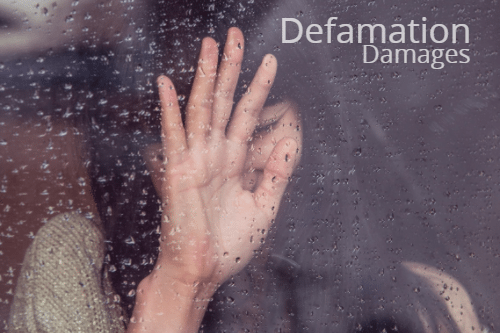
The fourth element in a Utah claim for defamation – damages – requires a plaintiff to prove they suffered damage or harm. Harm caused to a plaintiff and their reputation is typically quantified in the form of damages, an award that is usually monetary, meant to act as compensation for their injury or loss.
In defamation claims and cases, damages are typically divided into several categories. Let’s take a look at the various types of damages in Utah, and what a plaintiff must plead and prove in order to recover them.
- Special damages,
- Actual damages,
- Punitive damages, and
- Presumed damages
Special damages
Special damages are particular damages, which result from circumstances peculiar and specific to the case at hand.
As a refresher, defamation per quod is the opposite of defamation per se, and occurs when an allegedly defamatory statement requires extrinsic evidence to support it.
Special damages are associated with defamation per quod, while presumed damages are associated with defamation per se.
If words are not held to be slanderous or libelous per se, special damages must be pleaded and proved.
Because special damages are being sought for particular damages and circumstances caused, they must be:
- Specific,
- Actual, and
- Non-speculative. Id.
The Utah Supreme Court required a showing of economic connection between the allegend defamation and the claimed damages.
For example, proof of special damages usually involves the plaintiff demonstrating a sale at a reuced price or at a greater expense to the seller and it will not be sufficient to show that a land’s value has dropped on the market. A land’s value dropping on the market is general damage, and not realized or liquidated loss.
3 Examples of Utah Special Damages
- Business transactions and loss of stock value: Loss of stock value, negative impact on potential business transactions, and delay in NASDAQ listings are not “realized and liquidated damages” and thus will not constitute special damages.
- Technological products: Allegedly false statements published in an electronic news service about a breast imaging technology product did not allege specific damages required to state a claim for libel per quod under Utah law.
- Title actions: Attorney’s fees will be permitted as special damages in slander of title actions if incurred to clear title or to undo any harm created by slander of title. Id. at 1300.
Actual damages
Also referred to as “compensatory damages,” actual damages are a monetary award for plaintiffs who experience actual (real) harm, loss, or injury due to the libelous or slanderous publications of a defendant.
In Utah, for plaintiffs to recover actual damages, they must plead and prove actual harm by the allegedly defamatory statements. Complaints that merely imply that harm to future employment MAY occur do NOT allege any actual harm. Also, words that are only possibly injurious to some future happening will not give rise to a cause of action under either a per se or per quod defamation action. Id.
Note about Mental Distress
No Utah case has explicitly dealt with the issue of whether mental distress is compensable in a defamation case.
Two Examples of Utah Actual Damages
- Americans with Disabilities Act: An employee who was asked questions by his employer that violated the Americans with Disabilities Act did not merit nominal or punitive damages because he failed to establish that he suffered actual injuries as a result of the violation.
- Title action: A slander of title action requires proof of actual or special damages.
At common law, some other common examples of actual damages include:
- Lost income,
- Lost earning capacity,
- Loss of benefits,
- Loss of clients, partnerships, and customers, &
- Inability to find new or future employment.
Punitive damages
Commonly referred to as “exemplary damages,” punitive damages are as their name implies – punishment damages awarded to a plaintiff(s) in order to punish a defendant(s) for their defamatory statements or publications.
To recover punitive damages in Utah, a plaintiff must show the defendant acted with actual malice, which is further defined as “motivated by spite, hatred, or ill-will against the subject.” Fausett v. American Resources Management Corp., 542 F. Supp. 1234, 1242 (D. Utah 1982).
In order for a plaintiff to be awarded punitive damages, they must prove the following two (2) elements:
- Actual knowledge (by the defendant) that the statements made were false, or entertained serious doubts as to whether the statements were true; &
- Defendant’s conduct;
- Was willful & malicious; or
- Was intentionally fraudulent; or
- Manifested a knowing & reckless indifference towards the rights of others.
In Ferguson v. Williams & Hunt, the plaintiff was required to prove the defendants had a “particular subjective state of mind” in order to establish that there was a reckless disregard for falsity. The court found that the necessary state of mind will exist if “there is a high degree of awareness of probable falsity or serious doubt as to the truth of the statement.” Id.
Supporting this, “inherently improbable” or obviously doubtful statements may demonstrate a defendant had the necessary state of mind, allowing the recovery of punitive damages by the plaintiff. Id. citing Jensen v. Sawyers, 130 P.3d 325, 346 (Utah 2005).
3 Examples of Utah Punitive Damages
- Mistaken mugshot publishing: A Utah court did not find a newspaper acted with actual malice by mistakenly publishing the mugshot of a man with the same name as a man accused of embezzlement, because the newspaper honestly believed they were publishing a picture of the accused. Therefore, the Court concluded there was no reckless disregard of the truth and thus no malice by the defendants. Leishman v. Cache Valley Publ. LLC., 2011 Utah Dist. LEXIS 1.
- Defamatory news broadcast: A television reporter did not act with the “actual malice” necessary for punitive damages when she stated that a doctor “promised” her illegal drugs in an allegedly defamatory news broadcast. The report confirmed that prescribing that drug for weight loss was illegal and truly believed the doctor had offered her illegal drugs.
- School board removal: Although the defendants sought to become members of a school board – and didn’t approve of the plaintiff’s policies as a school district superintendent – and sought to remove him from his position, this wasn’t sufficient to imply malice for purposes of slander per se, nor was it sufficient to demonstrate actual malice.
Presumed damages
Simply put, presumed damages are damages which don’t require a plaintiff to prove any injury or harm. They are designed to help plaintiffs in recovering damages, by ultimately preventing defendants from contesting their assertion.
Utah presumes damages when a defendant uses words that “hold a person up to hatred, contempt, or ridicule, or injure him in his business or vocations.” Such stattements are actionable per se and damages will be presumed.
As mentioned above, special damages are associated with defamation per quod, while presumed damages are associated with defamation per se. When words are defamation per se, malice and damage are implied, and it’s not necessary for the plaintiff to prove special damages.
A notable ruling by the Utah Court of Appeals suggests that a plaintiff who proves defamation per se, but presents no proof of actual injury will not be entitled to recovery beyond nominal damages.
Two Examples of Utah Presumed Damages
- Presumed damages were not awarded in a defamation title action case which required proof of actual or special damages.
- A district court awarded presumed nominal damages for online comments, calling a limited liability company and an associated individual “crooks” and “scam artists.” Presumed damages were determined to be a method of relieving the plaintiff from the burden of proving damages as an element of defamation per se.
| Special Damages | Actual Damages | Punitive Damages | Presumed Damages | |
|---|---|---|---|---|
| Definition | Damages associated with defamation per quod, which require the plaintiff to prove a particular and quantifiable loss. | Damages causing actual and real harm, injury, or loss to a plaintiff. | Damages designed to punish a defendant for malicious, libelous, slanderous, and other defamatory behavior. | Damages associated with defamation per se, which do not require a plaintiff to prove injury, harm, or loss. |
| How to Prove | Plaintiff must provide extrinsic and supporting evidence to prove particular and special harm and injury. | Plaintiff must plead and prove actual harm, injury, and loss. | Plaintiff must prove the defendant acted willfully and maliciously, fraudulently, or recklessly. | Since presumed damages are associated with defamation per se, plaintiffs do not need to prove harm or damage. |
Libel Removal Tip: Sending a cease and desist letter to the offending website where malicious, false, and defamatory information is posted is a cheap and effective first step for letting the offending party know you mean business.
ᐧ
Additional Utah Defamation Nuances
Legal protections for anonymous speech in Utah
Uncovering anonymous online trolls and posters can be an overwhelming and stressful process. Although some states have laws and precedent set out guiding the uncovering of anonymous online posters, Utah’s hasn’t been favorable for defamed parties.
In 2011, a Federal District Judge denied a subpoena to uncover the identity of defendants who anonymously posted a false report that a company was changing its climate change policy on a fake website designed to look like the company’s real website. Koch Indus., Inc. v. Does, No. 2:10CV1275DAK, 2011 WL 1775765 (D. Utah May 9, 2011) (unpublished).
However, sex offenders do not enjoy such privacy and protections for anonymous speech.
Under the Utah sex offender registration statute, Utah Code Ann. § 77-27-21.5(2)(c)(i), it is not considered a violation of First Amendment rights to free speech to investigate someone registered under the statute for an Internet sex crime who has posted anonymously on the internet.
Discovery
A Utah District Court allowed discovery of computers and electronic devices used by a defendant’s wife to post defamatory comments on the internet to an IP address connected with the wife because she was also an employee of the defendant, and numerous “defamatory and disparaging posts” were identified. 1.800.Vending v. Wyland, No. 1:14-CV-00121, 2015 WL 1823425, (D. Utah Apr. 21, 2015).
Discovery of evidence that is declared transitory in nature may be expedited to determine the identities of the parties in a defamation and trademark infringement case.
Drug Use & Testing
U.C.A. 1953 § 34-38-11 denies a defamation cause of action related to drug use by an employee against an employer who has established a program of drug or alcohol testing, unless inaccurate test results or drug information are maliciously disclosed to any person other than the employer.
Frequently Asked Questions
Q. What effect has the Internet had on free speech?
A. In Utah, no court has officially ruled that internet speech should be entitled to greater protection than other types of speech.
However, strict rules for alloying subpoenas to uncover anonymous internet identities do reflect a courts desire to acknowledge the internet as an unprecedented democratic forum, advancing the free exchange of ideas. And, as such they should be “carefully safeguarded First Amendment rights to speak anonymously.
Additionally, in the context of the defense of opinion, courts may favor finding for the defendant. Note above, that the United States is generally considered a pro-defendant jurisdiction for defamation due to its upholding of the First Amendment – as opposed to European and other Commonwealth countries which are seen as more plaintiff-friendly.
In Westmont Residential LLC v. Buttars, statements made online by a tenant alleging that her previous landlords were “crooks and will take advantage of you!” was not found to constitute defamation per se because of its context of being posted on an online forum where readers would perceive the word “crooks” to be no more than rhetorical hyperbole. Also, the statement could merely be a reference to crooked behavior, which is not a direct violation of the criminal code.
Q. Can I bring a libel or slander lawsuit against a party who is out-of-state?
A. Yes. Utah has laid the framework for bringing a libel or slander lawsuit against out-of-state publishers and parties in several cases.
Most notably, they’ve ruled on bringing a defamation action against out-of-state defendants who defamed a business, which is discussed in Section 2 “Important Utah Defamation Requirements & Formalities.
Q. Can I retract, correct, or clarify a defamatory statement before litigation begins?
A. Although defendants may retract defamatory statements and publications prior to litigation, an apology is no defense to a cause of action after the defamation has already taken place. However, it may affect the award of damages to the plaintiff.
Q. Are Utah newspapers required to correct previously made & published false statements?
A. Utah Code Ann. Sec. 45-2-1, 1.5 requires newspapers to follow procedures for correcting false statements previously made in certain circumstances, upon demand of the person affected.
Utah law does however limit recovery to actual damages in the case of a good faith statement, publication or broadcast.
Such law does not apply to libel against any candidate for public office unless the retraction of the charge was made editorially and in a conspicuous manner at least five (5) days before the holding of such election, primary or political convention in case.
If such libelous article was published in a daily paper, or in a weekly paper, at least three days before the holding thereof (of the election), which editorial retraction shall be in lieu of any other retraction herein provided for.
Q. Does Utah have criminal defamation laws?
A. Yes. Utah does have criminal libel and slander laws. “A person is guilty of criminal defamation if he knowingly communicates to any person orally or in writing any information which he knows to be false and knows will tend to expose any other living person to public hatred, contempt, or ridicule.”
Although Utah does have criminal defamation laws in their books, in 2002, they criminal libel statute was declared overbroad and unconstitutional because it infringed constitutionally protected speech by punishing false statements about public figures made without knowledge or recklessness and true statements about public figures.
It’s worth noting that at the Federal level, there are no criminal defamation laws, because in 1966, the common law cause of action was declared unconstitutionally vague, leading to a rare enforcement of criminal defamation at the state-level.
3 Cases of Utah Criminal Defamation
- Utah’s criminal libel statute was determined to be an infringement on constitutionally protected speech by punishing comments made by a high school student on a website about his teachers, classmates, and principal.
- In a case where the defendant published allegedly defamatory things about a plaintiff in a circular at the community post office, the defendants were granted a new trial when it was couldn’t be said whether the decision should be judged off of the jury’s ability to interpret what was being said in the circular, or whether it should be based off the jury knowing who the target of the article was.
- A new trial was granted to a defendant who published that the candidate for the constitutional convention was guilty of misfeasance and malfeasance in his role as a prosecuting attorney, was unprofessional and dishonest. It was held that trial testimony was material to the question of malice.
Q. Does Utah have Anti-SLAPP laws?
A. Short for “strategic lawsuit against public participation,” a SLAPP lawsuit is a meritless lawsuit filed against a person(s) in order to intimidate, scare, censor, or burden them with excessive legal costs.
In 2001, Utah enacted Anti-SLAPP legislation, titled the “Citizen Participation in Government Act,” protecting comments made by defendants while participating in the process of government.
The Utah Supreme Court ruled that participation in the process of government is limited to exercise of a right to influence legislative or executive decision making. Also, a publisher’s “election notice,” although part of public debate to influence voters’ decision, was determined not to influence the decision making of the legislative or executive branches of government. Id.
For example, an “election notice” published on a newspaper’s website, accusing an election candidate of “negative campaigning” and distributing “false and misleading information,” was not protected by Anti-SLAPP legislation because it did not influence legislative or executive decision making participation in the process of government.
Q. Does Utah Recognize the Legal Doctrine of Prior Restraint?
A. As of publishing, there is no Utah precedent for prior restraint in the context of defamation and this is an area of law that may still be decided on.
Q. What is defamation insurance? What parties are at high-risk of defamation lawsuits? Do I need to purchase defamation insurance?
A. Generally, most people carry some sort of insurance policy (ex. Homeowners coverage or life insurance), however, those policies often fail to cover defamation claims. Defamation insurance covers slander and libel claims against you or your business and is typically covered under “excess liability,” an insurance policy providing extra coverage beyond the original scope of the policy.
Unless you are engaged in a high-risk profession, such as journalism, freelancing, or you’re an independent contractor, you probably don’t need to purchase defamation insurance.
To read up further on what defamation insurance is, high-risk parties, and what your policy should include, check out our detailed blog post titled, “What is Defamation Insurance and Do I Need It?”.

Work With the Defamation Removal Lawyers of Minc Law to Remove Libelous and Defamatory Online Content
If you’re a resident of Utah, or any other U.S. state, the internet defamation removal lawyers of Minc Law want to work with you to swiftly and permanently remove any online defamation targeting you or a loved one. At Minc Law, we boast a nearly 100% removal rate of defamatory online content, have litigated defamation cases in over 26 states and 5 countries, and have secured hundreds of removals.
Here’s what you can expect when working with Minc Law:
- We will treat you with respect & courtesy: At Minc Law, we know online defamation is highly invasive and can be incredibly stressful. our defamation lawyers are here to work with you. After all, your goals are our goals.
- Communication: After the removal process has commenced, we will stay in constant contact with you to update you on the details of your removal. At Minc Law, we pride ourselves on our open communication.
- We get results: We know who to work with and how to contact them. Our lawyers have worked closely with website administrators, content managers, and third-party arbitration firms to secure countless swift and effective takedowns. Websites and businesses respond to Minc Law.
When it comes to suing for defamation, costs are a number one concern for our clients. While there is no one-size-fits-all answer for determining a defamation lawsuit’s total costs, there are several major factors that may impact the required budget to sue for libel or slander. If you are considering the option of filing a defamation lawsuit to stop libelous attacks to your reputation, we recommend checking out the video below to learn the stages of a defamation lawsuit and the unique factors that can affect costs.
Video: How Much Does a Defamation Lawsuit Cost? Cost to Sue For Defamation

If you are the target of defamatory attacks, we can help hold the perpetrators accountable. We fight for our clients using both litigation (lawsuits) and non-litigation alternative methods. Contact us today to schedule your free, initial no-obligation consultation with an intake specialist by calling us at (216) 373-7706, or by filling out our contact form online.
We want to fight for your reputation.
★★★★★
“I have peace of mind for the first time in 3.5 years. Andrew Stebbins and Dorrian Horsey worked quickly to resolve a situation where I was being slandered online. They were fast, responsive, and handled a delicate case with professionalism and integrity. Highly recommended.”
Anonymous, September 7, 2021
Get Your Free Case Review
Fill out the form below, and our team will review your information to discuss the best options for your situation.
This page has been peer-reviewed, fact-checked, and edited by qualified attorneys to ensure substantive accuracy and coverage.



